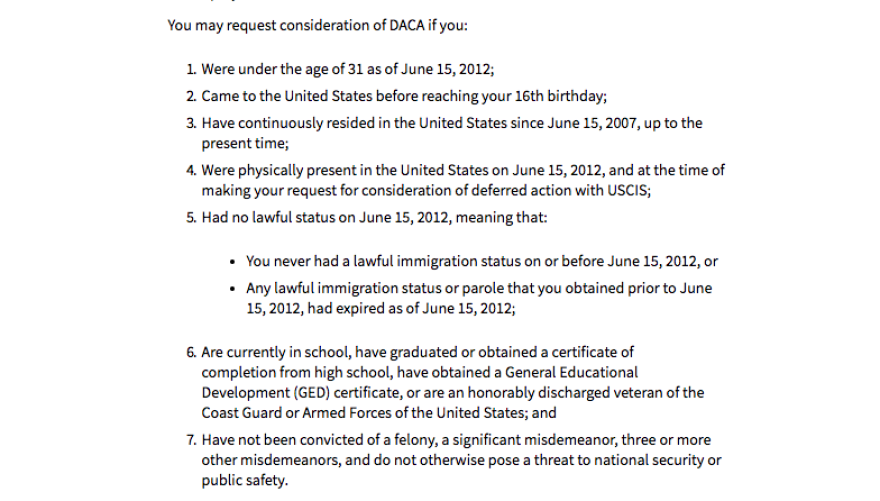Immigration—or immigration enforcement—has been a signature issue for President-elect Donald Trump. One policy he has vowed to repeal is DACA, or Deferred Action for Childhood Arrivals, which gives about 750,000 young immigrants the ability to work and go to college here in the U.S.
There’s a long list of eligibility requirements for DACA, including arriving in the U.S. before your 16th birthday. Julio Calderon missed that deadline by a month. Now he’s an organizer with the Florida Immigrant Coalition; he spoke to WLRN about how Dreamers are gearing up for a President Trump:

The following transcript has been edited and condensed for clarity.
How and why did you come to the U.S.? When did you get involved in activism around immigration?
We decided to come at the age of 16. Honestly, because of the violence. The gangs are always looking for membership, so they always look for someone who is between the ages of 14 or 20. So we decided to leave Honduras. It took about 30 days going through Guatemala, Mexico and then we finally made it to the U.S. The way I started activism: I went to high school. I graduated. You know, I knew that I was undocumented. So for me college was never an option until someone who knew my mom or someone else at Miami Dade College and she was the one that helped us navigate through this system. And that's when I found out about an organization called SWER: Students Working for Equal Rights. And I was never part of any organization before. I went inside and then there were about all the people we talked about, what it meant to be undocumented and all of that. So for me it was a space where I could be myself, and, you know, also being able to help a lot of my friends who never got to college.
Donald Trump ran his presidential campaign on a platform of deportations and very hard-line immigration policy. What are you hearing from dreamers about their concerns for a Trump presidency?
So it has changed. It was either before when he ran and then after he got elected. After the elections, Donald Trump said that he was only going to deport those who had a criminal record—up to 3 million people. I feel like that comment made people feel comfortable in a way for them to say, ‘Well, I don't have a criminal record so I'm not going to get deported.’ We need to be careful when we hear politicians speak, when they say that they're only going to deport criminals because driving without a license is a criminal charge. And a lot of our undocumented folks, including myself, have gotten tickets for driving without a license. So does that mean that I'm one of those criminals you are talking about, even though that's all that I have?
There was a period of time when immigration reform seemed like a broad bipartisan issue. And then, under the Obama administration, we saw it fall apart very quickly. But we also saw DACA get enacted—Deferred Action for Childhood Arrivals. What went through your mind on the day that DACA passed and what did you hear from friends and family?
And this is when I get a little bit emotional. At that point we have been organizing for maybe three or four years. The Dream Act had failed before. It solidified the fact that we were a movement and we could get things done. People were fighting because we all have a dream. It’s not about passing the legislation; it's about what was beyond, after the legislation passes, either going to school, working. But I do think that now Trump has created a sense of urgency and let's see how people react to that. You know, it's been four years. Many of them .... already graduated, some of them lawyers, nurses. So this is when not only dreamers have to stand up but also these corporations—these people who are hiring them and who are benefiting from their work. If there is a sense of urgency and then people can feel that, then it doesn't matter who's in the room. We're going to get things done.
So far we've heard a lot of rhetoric from Donald Trump. We've heard some sort of vague ideas on policy, some more specific some contradiction or layers there that are hard to pick apart. What are you planning, if anything specifically, for the first days of the Trump presidency?
So two different things: Yes, Trump might contradict himself; yes he doesn't have clarity on policy but the people he's been appointing, they do. And that's why we're really scared. Second there are already protests being organized at a national level to go to Washington D.C. on Jan. 20. People are already talking about boycott on a national level, on that same day—people not going to work, people are not participating in the economy for a whole day. I personally believe that's something that we'll get on especially the corporations who benefit from immigrants to go to Washington D.C. and say stop. We need to start thinking how to move forward, how to move policy forward, because we can be undocumented forever.


